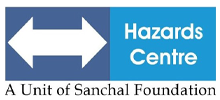Training & Workshop
- Home
- Training & Workshop
Informed Public Debate
The Hazards Centre believes that to be able to facilitate a vibrant public dialogue around issues of justice, it is crucial to reach out and engage with a wide range of groups. This includes poor communities, middle-class groups, students, law and policy makers as well as media persons. It is with this aim that we arrange for trainings, workshops, exposure tours, seminars, lectures and press conferences regularly and through the year.
Trainings and Workshops
Being a support group, one of our most important roles is to organize workshops with communities and students which they request in order to provide them with a diverse sets of information and skills to get upon their own problems. Special attention is paid to train community volunteers who are able to take up community issues, collect and collate information, and develop pro-people policy instruments, a process which thus becomes the basis of informed governance and decision-making.
Feedback from workshops and continuing demand from groups suggests that such information provision and training has significantly enhanced the capacity of community groups and of the student volunteers- To gather data, analyse it, and use it for meeting their needs of daily survival
- To understand policies and react to legislative changes
Some of our past workshops include
| • | Calculation of electricity consumption | : | This workshop with Gautampuri women helped them to understand why their electricity bills were so high and subsequently they went to the electricity board to negotiate the correct charges. |
| • | Map-reading and land measurement | : | Held with Bhalaswa Lok Shakti Manch at Bhalaswa resettlement colony, this workshop enabled people to map their colony and check whether it conforms to plan. |
| • | Model making | : | The workshop, held with Kislay, an organization working in the slum clusters in West Delhi, helped them to prepare for an exhibition on the Right to Infomration. |
| • | Rights and governance | : | These workshops were held with Community volunteers from Sajha Manch, and public meetings with a range of citizen’s groups on the Master Plan were also arranged. These helped them to understand their rights and policies of government in a better way. |
| • | Right to Information | : | These workshops were held with Sajha Manch activists, RWA representatives, Parivartan activists and residents of Vikaspuri. |
| • | Resettlement and services | : | With field workers of Action India. |
| • | Services, shelter, and livelihood | : | With Sajha Manch activists |
| • | Employment and urban growth | : | With Action Aid partners |
| • | Civic amenities and role of NGOs | : | With Child Relief and You partners |
| • | River Pollution and Health | : | With slum children from Bhalaswa, Nandnagari and Gautampuri settlements |
| • | Sewage Disposal, Right to Information, Ration cards | : | With field workers of Ankur |
| • | Electricity supply norms and PDS | : | With residents of Masoodpur, field workers of Bal Vikas Dhara |
| • | Problems of auto-rickshaws | : | With auto-rickshaw drivers and Transport Department officials |
| • | Safety at Work and Waste Management Plans | : | With rag-pickers, waste handlers, activists of Chintan Environmental Research Group |
| • | Privatisation of Delhi Vidyut Boar | : | With consumers, employees of Delhi Vidyut Board |
| • | Public Health facilities | : | With members of Jan Swasthya Abhiyan, Forces |
| • | Regularisation of Unauthorised colonies | : | With residents of Kanjhawala, members of Lok Panchayat, Jan Sangharsh Vahini |
| • | Rickshaw Policy | : | With workers of Lokayan |
| • | Urban Policy and eviction | : | With workers of Mobile Creche |
| • | Area mapping as a tool to resist evictions | : | With members of Nirmaan Mazdoor Panchayat Sangham |
| • | Yamuna Development Plan | : | With residents of Yamuna Pushta jhuggi clusters |
| • | Facilities for challenged children, PDS and RTI | : | With residents of slum clusters, field workers of Aastha |
| • | Impact of eviction and resettlement | : | With residents of resettlement colonies |
| • | Environment awareness | : | With children in MCD schools of Jahangirpuri, workers of Ankur and TERI |
| • | Self-Employment | : | With children in MCD schools of Jahangirpuri, workers of Ankur and TERI |
| • | Migrant Labour | : | With activists of AITUC |
| • | Safety Norms | : | With field workers of Sabla Sangh |
| • | Common effluent treatment plants and industrial area drainage mapping | : | With industrial workers and waste pickers |
| • | Hazards and safety provisions for pedestrians | : | With informal sector workers |
| • | Mapping of pavement dwellers and night shelters | : | With Beghar Mazdoor Sangahrsh Samiti of homeless |
